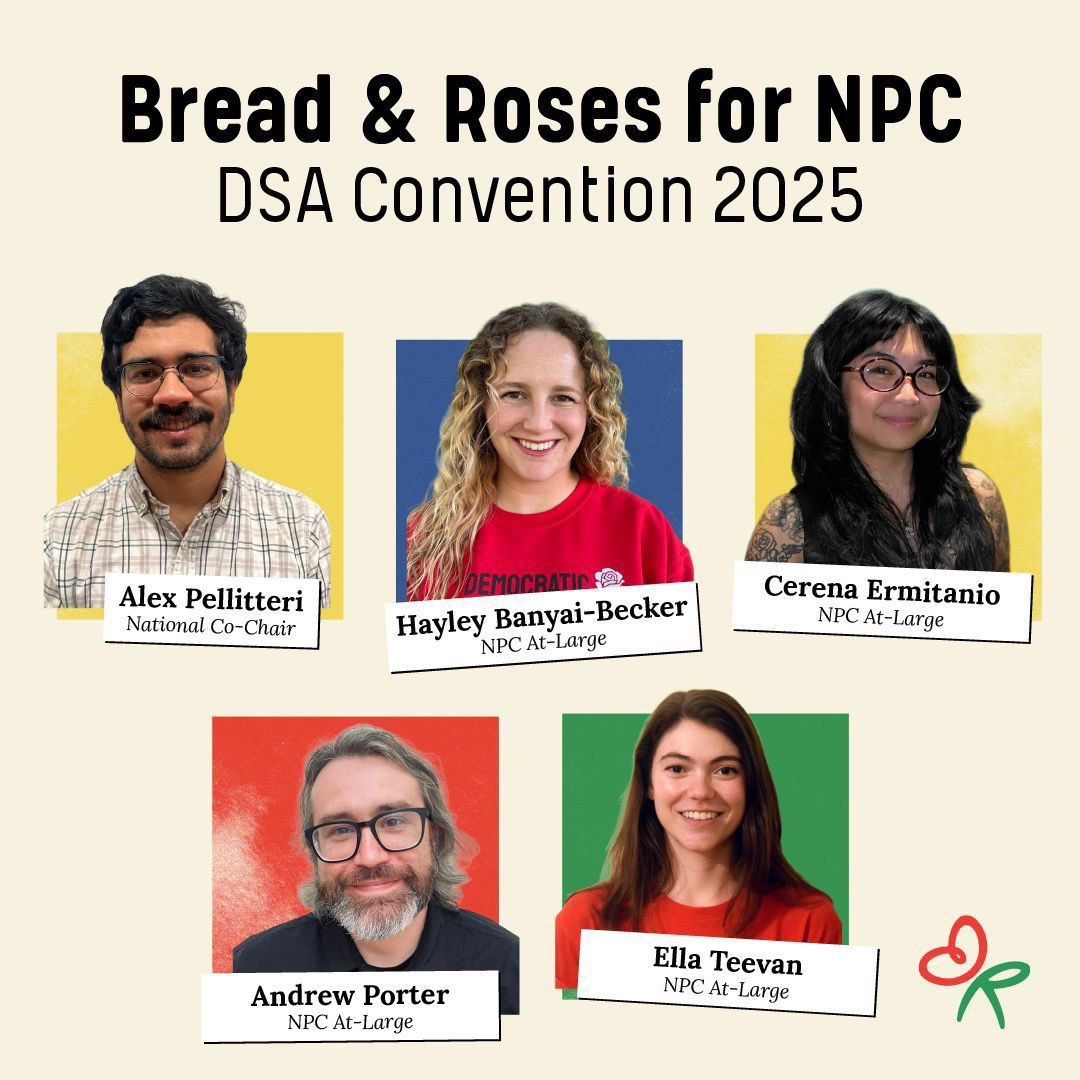Groundwork, a slate of candidates for the 2023 NPC election, recently submitted two amendments to the consensus resolution from the National Labor Commission. Consensus Resolution Amendment H, “We Are Workers,” illustrates some foundational differences between the Groundwork perspective and that of Bread & Roses, which champions the rank-and-file strategy.
Here are three reasons I encourage delegates to the National Convention to vote no on this amendment:
1. It confuses the path to majoritarian action.
This amendment talks a lot about “high participation.” That may seem like a no-brainer at first, especially to anyone who has read Jane McAlevey. We always hope to have more people involved than fewer! That’s “mass” organizing.
But minority action can be a path to future majoritarian action — in fact, every organizing drive and reform movement begins as a minority. Reaching high participation democratically often first requires supporting a smaller militant group in taking risks and heightening conflict to raise consciousness and attract people to an alternative to the status quo.
Teamsters for a Democratic Union (TDU) is among the best examples of a militant minority building towards majority support. TDU began in 1975 as “Teamsters for a Decent Contract,” a small group of freight Teamsters in Chicago who organized their coworkers to push IBT President Fitzsimmons to adopt stronger contract demands. TDU.org recounts that “Under this pressure, Fitzsimmons called the first national strike in the Teamsters’ history.” At the 1976 Teamsters convention, there was just one TDU delegate. He was ignored on the floor and got beaten up later outside. Fifteen years later, TDU-endorsed candidate Ron Carey won his election for IBT President.
Socialists should be involved in those fights from the beginning, not just watching from the sidelines and cheering once a majority is confirmed. Our goal is not merely to support what a majority of workers think, but to demonstrate to the majority that our ideas can win, even in moments when they are only held by a minority.
Obviously not all minority actions are helpful in building towards a majority. Socialists should reject a strategy that relies on the perpetual isolation of an “enlightened” few. The tactical merit of our choices should be judged by how well they add to the number of people willing to stand together and take risks as a group. But if we insist on high participation from the start, we’ll be stuck with conservative, low-risk actions that limit our ability to create new shop-floor leaders and escalate our demands. Leadership development, rather than a reliance on a few officers or unelected staff to run “large” campaigns, is an essential part of union democracy and worker power.
2. It confuses our orientation to rank-and-file workers.
This amendment deletes a key line: that DSA “rejects a strategy that prioritizes building relationships within the union establishment.”
It’s not an inconsequential change, as some proponents have argued. DSA once prioritized courting prominent labor leaders. Figures like International Association of Machinists President William Winpisinger and AFL-CIO President John Sweeney were recruited to DSA, and Winpisinger even served in DSA leadership. But they were never advocates of rank-and-file empowerment. Winpisinger denounced TDU as “outside forces” and called the steelworkers’ reform leadership “irresponsible” when they challenged management. It should be explicit that we’re not going back to the days when recruiting figures like Winpisinger was the focus of DSA’s labor strategy.
The labor movement establishment and the local unions within it are almost always risk-averse and uninterested in (or outright hostile to) putting members in the driver’s seat. But even if they weren’t — even if most union leaders were Labor Notes enthusiasts or bleeding-heart communists — they do not have power on their own. Everything we want to accomplish, every campaign we hope to win, depends on masses of class warriors going to battle. Their capacity for self-emancipation is our priority, and we can’t depend on shortcuts through the bureaucracy. The NLC resolution should make that clear.
However, relationships with key leaders can certainly help us reach rank-and-file members. Officers and staff are often entry points. If we hope to form coalitions with unions or be invited to support their struggles, we should avoid unnecessarily alienating powerful decision-makers and individuals that workers regard as a leader.
But there will be moments of conflict, and we need to prepare to sacrifice our sway with insiders in order to support democracy, militancy, and leadership development among workers. For instance, in 2022, Portland DSA encountered this dilemma when we supported a public sector contract campaign of several hundred AFSCME members. We took initiative and organized rallies and direct actions leading up to the potential strike date. The president, vice president, and several other member-leaders were thrilled — but the regional council leadership was not. Perhaps worried about outsider influence or appearing weak to their members, executive staff began planning their own events and excluding DSA from collaborating. If we had been primarily invested in a legislative lobbying relationship with AFSCME’s establishment, we might have immediately backed off in order not to upset staff. But because we had developed a relationship with members, we were able to maintain our active pre-strike support until the local ratified a contract. As a result of our intervention, we recruited several members of that local into DSA, and one of them is even a chapter delegate to the 2023 National Convention!
3. It inexplicably removes language about “building” and “collaborating with” Labor Notes.
Labor Notes is the most important labor education organization in the United States, and socialists have helped build and run it since the beginning. Labor Notes champions a “bottom-up” view of labor power. They publish countless books and articles, hold online training sessions, coordinate industry networks, and organize regional and national conferences that bring together workers from around the world to learn about workplace democracy and how to build a fighting labor movement. 4,000 people attended the 2022 Labor Notes Conference in Chicago, and thousands more participated in local Troublemakers Schools!
Labor Notes trains shop-floor leaders who socialists want to work alongside. DSA members should not merely “attend” Labor Notes events, as the amendment says; we must invest in building it and working alongside it to continue to bridge the gap between the socialist and labor movements.
Vote for the Labor Resolution Unamended
Delegates should also oppose Amendment E: “For a DSA Ready to Move in the Labor Movement,” which waters down the prescription for paid elected NLC leadership — an imperative change if we want DSA to be more member-driven at the national level. Rather than improving the base resolution, Groundwork’s amendments contradict the spirit of the rank-and-file strategy.
As written, Consensus Resolution #5 from the NLC, “Our Role in a Resurgent Labor Movement,” puts forward a strong motivation for socialists embedding ourselves in labor organizing and a clear vision for how to support bottom-up militancy. It discusses forming industry networks with a strategic emphasis on logistics, encouraging socialists to take union jobs, supporting EWOC and exploring salting to organize the unorganized, strengthening our Labor Corps, organizing solidarity campaigns, and democratizing our unions. Vote yes on the NLC consensus resolution to approve this comprehensive and principled plan of action!




